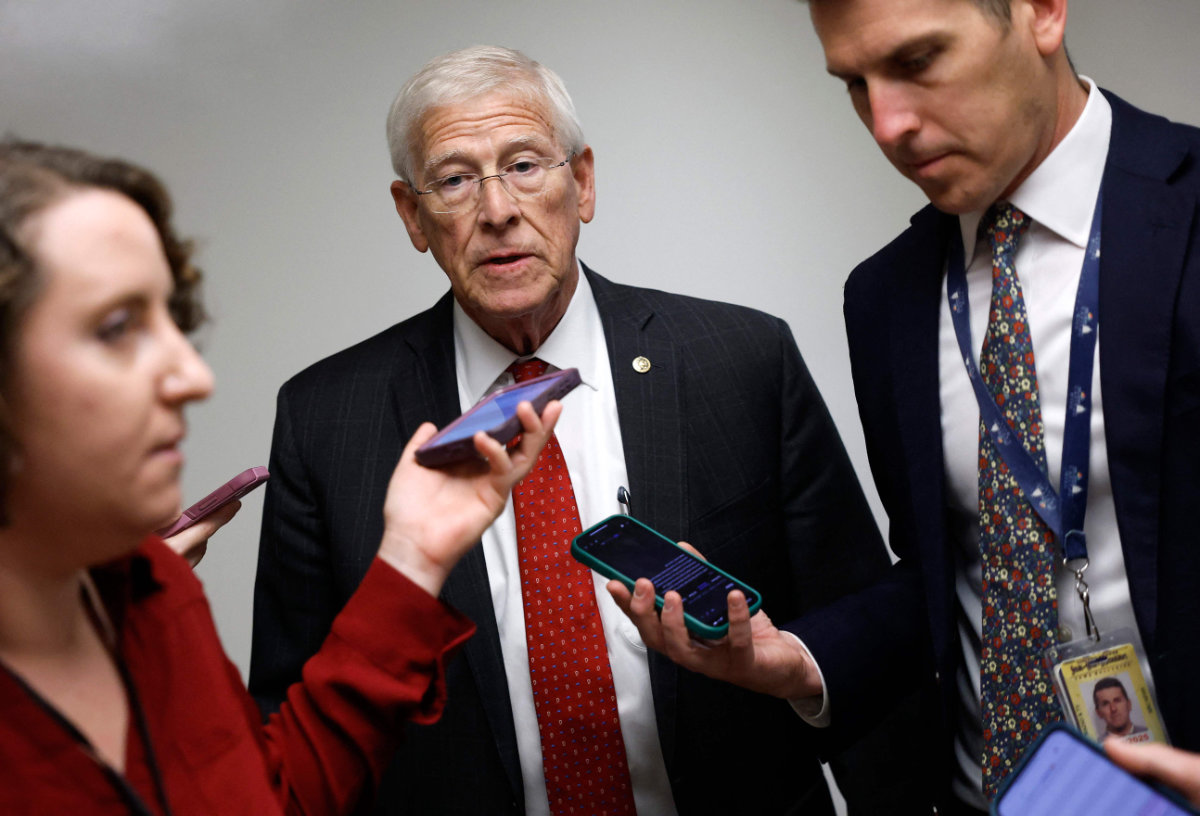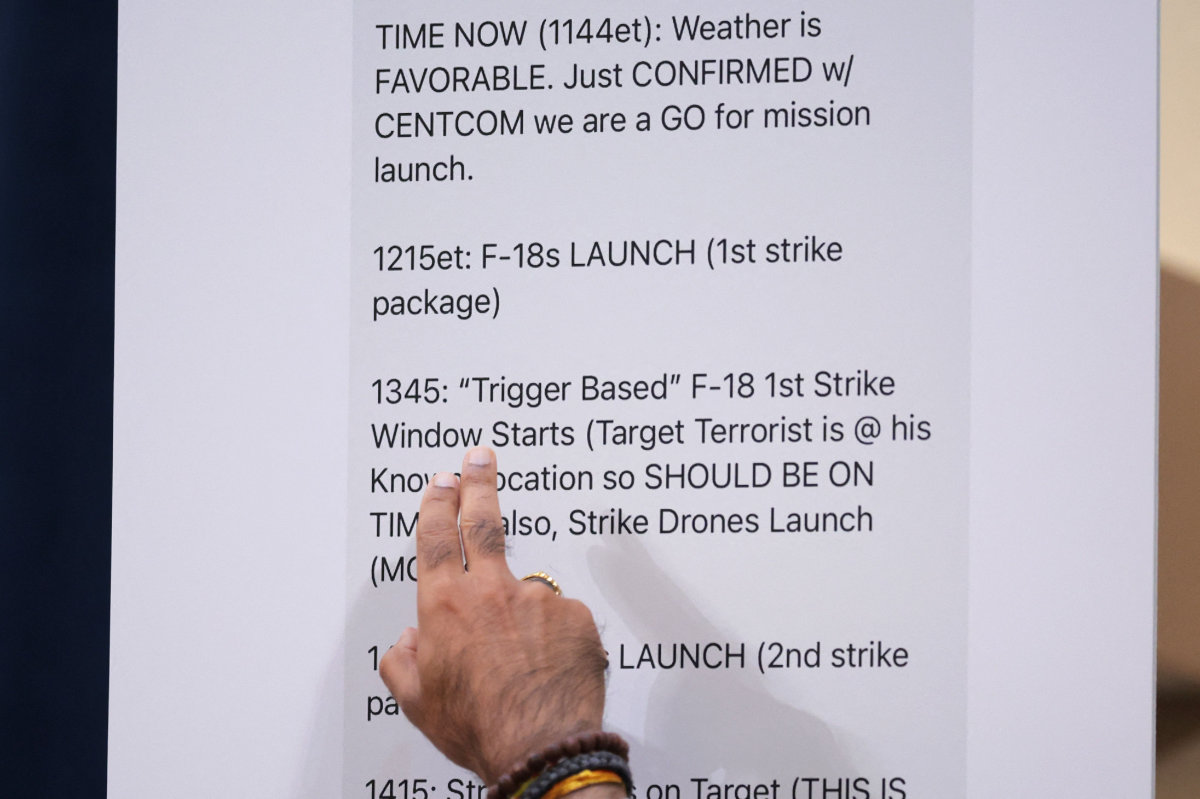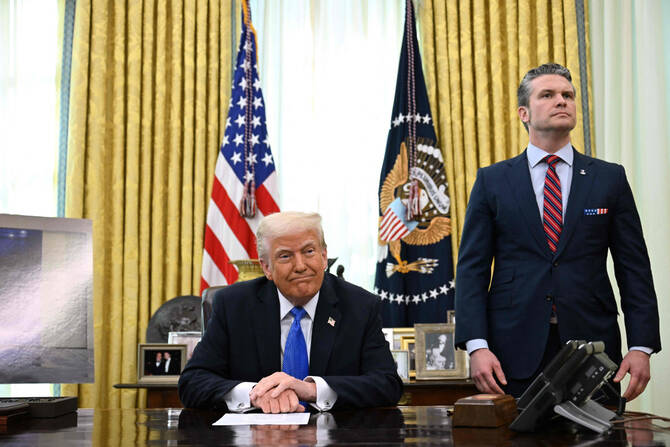WASHINGTON: Defense Secretary Pete Hegseth texted about plans to kill a Houthi militant leader in Yemen two hours before a military operation meant to be shrouded in secrecy, according to screenshots of a chat released by The Atlantic on Wednesday.
The revelation that highly sensitive attack plans were shared on a commercial messaging app, possibly on personal cellphones, has triggered outrage in Washington and calls from Democrats that members of Trump’s national security team be fired over the leaks.
Republican President Donald Trump’s administration has sought to contain the fallout from the revelation that the March 15 chat included The Atlantic’s editor-in-chief Jeffrey Goldberg on the encrypted messaging app Signal.
Hegseth has repeatedly denied texting war plans, and Trump and his top advisers are saying no classified information was shared, bewildering Democrats and former US officials, who regard timing and targeting details as some of the most closely held material ahead of a US military campaign.
“I think that it’s by the awesome grace of God that we are not mourning dead pilots right now,” Democrat Jim Himes of Connecticut said at a hearing of the House of Representatives Intelligence Committee.
Republican Senator Roger Wicker, who leads the Pentagon’s oversight committee in the Senate, joined calls for an independent probe and said the texts appeared so sensitive “I would have wanted it classified.”

US Sen. Roger Wicker speaks to reporters at the US Capitol on March 25, 2025 in Washington, DC, ahead of a hearing on a mounting scandal over leaked plans for military strikes on Yemen's Houthi militia. (Getty Images via AFP)
If Houthi leaders knew a strike was coming, they might have been able to flee, possibly to crowded areas where targeting is more difficult and the number of potential civilian casualties might be deemed too high to proceed.
The chat did not appear to include any names or precise locations of Houthi militants being targeted or to disclose information that could have been used to target US troops carrying out the operation.
Pentagon officials aware of the planning believed that information Hegseth texted was classified at the time, one US official told Reuters, speaking on condition of anonymity, raising questions over whether, when and how Hegseth’s text messages may have been declassified.
It has also renewed scrutiny of Hegseth, who only narrowly won Senate confirmation after a bruising review that raised serious questions about his experience, temperament and views about women in combat.
The White House played down the idea that Hegseth or others would lose their jobs, saying Trump retained confidence in them.
Trump also played down the Yemen leak, calling it a “witch hunt” and defending Hegseth.
“Hegseth is doing a great job,” Trump said.
Goldberg, who had initially declined to publish the chat details, did so on Wednesday. The Atlantic magazine did not immediately respond to a request for comment on the release of the additional messages.
‘Team update’
Hegseth’s text started with the title “TEAM UPDATE” and included these details, according to The Atlantic:
“TIME NOW (1144et): Weather is FAVORABLE. Just CONFIRMED w/CENTCOM we are a GO for mission launch“
“1215et: F-18s LAUNCH (1st strike package)”
“1345: ‘Trigger Based’ F-18 1st Strike Window Starts (Target Terrorist is @ his Known Location so SHOULD BE ON TIME – also, Strike Drones Launch (MQ-9s)”
“1410: More F-18s LAUNCH (2nd strike package)”
“1415: Strike Drones on Target (THIS IS WHEN THE FIRST BOMBS WILL DEFINITELY DROP, pending earlier ‘Trigger Based’ targets)”
“1536 F-18 2nd Strike Starts – also, first sea-based Tomahawks launched.”
“MORE TO FOLLOW (per timeline)”
“We are currently clean on OPSEC”
“Godspeed to our Warriors.”

Text messages by Defense Secretary Pete Hegseth on a high level Trump administration Signal group chat discussing plans to bomb Houthi targets in Yemen are shown during a US House of Representatives hearing on March 26, 2025 in Washington, DC. (Getty Images via AFP)
Hours later, national security adviser Mike Waltz confirmed to the group the killing of the Houthis’ top missile expert.
“We had positive ID of him walking into his girlfriend’s building and it’s now collapsed,” Waltz wrote, disclosing that the US was carrying out surveillance operations.
Reuters could not immediately establish what kind of building was brought down in the US military strike, how many occupants were inside, and how the detail squares with Pentagon statements there were no known civilian casualties.
Hegseth has declined to answer questions about whether he declassified the information on the Signal chat, perhaps retroactively. In Hawaii on Wednesday, he played down the controversy, telling reporters the texts contained “no locations, no routes, no flight paths, no sources, no methods.”
In Jamaica, US Secretary of State Marco Rubio, who was part of the chat group, acknowledged to reporters that someone “made a big mistake” by adding a journalist to the chat. But he also dismissed concerns about any impact on the operations.
Senior US national security officials have classified systems that are meant to be used to communicate secret materials.
But CIA Director John Ratcliffe testified on Tuesday at a Senate hearing that Waltz set up the Signal chat for unclassified coordination and that teams would be “provided with information further on the high side for high-side communication.”
Waltz has said he took full responsibility for the breach as he had created the Signal group. But on Wednesday, Waltz also played down the disclosure, saying on X: “No locations. No sources & methods. NO WAR PLANS. Foreign partners had already been notified that strikes were imminent.”
At a hearing on Wednesday, Director of National Intelligence Tulsi Gabbard said Hegseth would be the one to determine what defense information was classified.
“Ultimately, the secretary of defense (holds) the authority to classify or de-classify.” Gabbard said, addressing the House Intelligence Committee.
The US military has so far declined to publicly offer even basic details about the offensive in Yemen, including how many strikes have been carried out, what senior leaders have been targeted or killed and even whether the operation has a name.




























